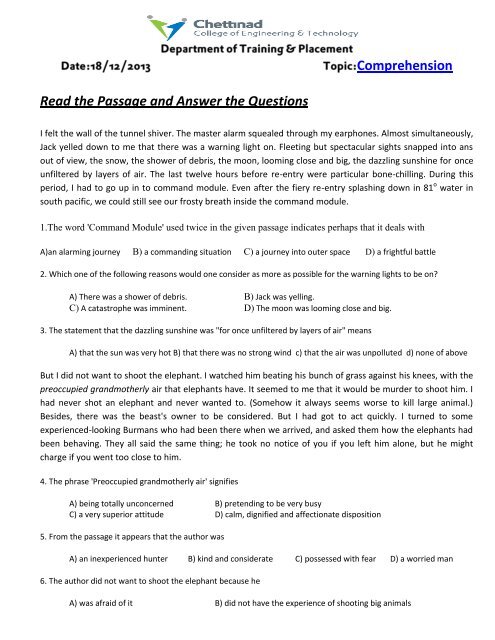Comprehension Read the Passage and Answer the Questions
Comprehension Read the Passage and Answer the Questions
Comprehension Read the Passage and Answer the Questions
You also want an ePaper? Increase the reach of your titles
YUMPU automatically turns print PDFs into web optimized ePapers that Google loves.
C) did not wish to kill animal which was not doing anybody any harmD) did not find <strong>the</strong> elephant to be ferociousHarold a professional man who had worked in an office for many years had a fearful dream. In it, he foundhimself in a l<strong>and</strong> where small slug-like animals with slimy tentacles lived on people's bodies. The peopletolerated <strong>the</strong> loathsome creatures because after many years <strong>the</strong>y grew into elephants which <strong>the</strong>n became<strong>the</strong> nation's system of transport, carrying everyone wherever he wanted to go. Harold suddenly realised tha<strong>the</strong> himself was covered with <strong>the</strong>se things, <strong>and</strong> he woke up screaming. In a vivid sequence of pictures thisdream dramatised for Harold what he had never been able to put in to words; he saw himself as lettingsociety feed on his body in his early years so that it would carry him when he retired. He later threw off <strong>the</strong>"security bug" <strong>and</strong> took up freelance work.7.In his dream Harold found <strong>the</strong> loathsome creaturesA) in his village B) in his own house C) in a different l<strong>and</strong> D) in his office8. Which one of <strong>the</strong> following phrases best helps to bring out <strong>the</strong> precise meaning of 'loathsome creatures'?A) Security bug <strong>and</strong> slimy tentacles B) Fearful dream <strong>and</strong> slug-like animalsC) Slimy tentacles <strong>and</strong> slug-like animals D) slug-like animals <strong>and</strong> security bug9. The statement that 'he later threw off <strong>the</strong> security bug' means thatA) Harold succeeded in overcoming <strong>the</strong> need for security B) Harold stopped giving much importance to dreamsC) Harold started tolerating social victimization D) Harold killed all <strong>the</strong> bugs troubled him10. Harold's dream was fearful becauseA) it brought him face to face with reality B) it was full of vivid pictures of snakesC) he saw huge elephant in it D) in it he saw slimy creatures feeding on people's bodiesLaws of nature are not comm<strong>and</strong>s but statements of acts. The use of <strong>the</strong> word "law" in this context is ra<strong>the</strong>runfortunate. It would be better to speak of uniformities in nature. This would do away with <strong>the</strong> elementaryfallacy that a law implies a law giver. If a piece of matter does not obey a law of nature it is punished. On <strong>the</strong>contrary, we say that <strong>the</strong> law has been incorrectly started.11. If a piece of matter violates nature's law, it is not punished becauseA) it is not binding to obey it B) <strong>the</strong>re is no superior being to enforce <strong>the</strong> law of natureC) it cannot be punished D) it simply means that <strong>the</strong> facts have not been correctly stated by law12. Laws of nature differ from man-made laws becauseA) <strong>the</strong> former state facts of Nature B) <strong>the</strong>y must be obeyedC) <strong>the</strong>y are natural D) unlike human laws, <strong>the</strong>y are systematic13. The laws of nature based on observation are
A) conclusion about <strong>the</strong> nature of <strong>the</strong> universe. B) true <strong>and</strong> unfalsifiableC) figments of <strong>the</strong> observer imagination D) subject to change in <strong>the</strong> light of new facts14. The author is not happy with word 'law' becauseA) it connotes rigidity <strong>and</strong> harshness B) it implies an agency which has made <strong>the</strong>mC) it does not convey <strong>the</strong> sense of nature's uniformity D) it gives rise to false beliefsMale lions are ra<strong>the</strong>r reticent about exp<strong>and</strong>ing <strong>the</strong>ir energy in hunting more than three quarters of kills aremade by lionesses are in front, tensely scanning ahead, <strong>the</strong> cubs lag playfully behind <strong>and</strong> <strong>the</strong> males bring up<strong>the</strong> rear, walking slowly, <strong>the</strong>ir massive heads nodding with each step as if <strong>the</strong>y were bored with <strong>the</strong> wholematter. But slothfulness may have survival value. With lionesses busy hunting, <strong>the</strong> males function as guardfor <strong>the</strong> cubs, protecting <strong>the</strong>m particularly from hyenas.15. According to <strong>the</strong> passage male lions generally do not go for huntings becauseA) <strong>the</strong>y don not like it B) <strong>the</strong>y want lioness to get trainingC) <strong>the</strong>y wish to save <strong>the</strong>ir vigour for o<strong>the</strong>r things D) <strong>the</strong>y are very lazy16. Male lions protect <strong>the</strong>ir cubs17. Lioness go for huntingA) from <strong>the</strong> members of <strong>the</strong>ir own species B) from hyenas onlyC) from hyenas as much as from o<strong>the</strong>r enemies D) more from hyenas than from o<strong>the</strong>r animalsA) all alone B) with <strong>the</strong>ir male partners only C) with <strong>the</strong>ir cubs <strong>and</strong> male partners D)with <strong>the</strong>ir cubs only18. When <strong>the</strong> lionesses go in search for <strong>the</strong>ir prey, <strong>the</strong>y are veryA) serious B) cautious C) playful D) sluggishAt this stage of civilisation, when many nations are brought in to close <strong>and</strong> vital contact for good <strong>and</strong> evil, it isessential, as never before, that <strong>the</strong>ir gross ignorance of one ano<strong>the</strong>r should be diminished, that <strong>the</strong>y shouldbegin to underst<strong>and</strong> a little of one ano<strong>the</strong>r's historical experience <strong>and</strong> resulting mentality. It is <strong>the</strong> fault of <strong>the</strong>English to expect <strong>the</strong> people of o<strong>the</strong>r countries to react as <strong>the</strong>y do, to political <strong>and</strong> international situations.Our genuine goodwill <strong>and</strong> good intentions are often brought to nothing, because we expect o<strong>the</strong>r people tobe like us. This would be corrected if we knew <strong>the</strong> history, not necessarily in detail but in broad outlines, of<strong>the</strong> social <strong>and</strong> political conditions which have given to each nation its present character.19. According to <strong>the</strong> author of 'Mentality' of a nation is mainly product of itsA) history B) international position C) politics D) present character20. The need for a greater underst<strong>and</strong>ing between nationsA) was always <strong>the</strong>re B) is no longer <strong>the</strong>re C) is more today than ever before D) will always be <strong>the</strong>re20. The character of a nation is <strong>the</strong> result of itsA) mentality B) cultural heritage C) gross ignorance D) socio-political conditions
21. According to <strong>the</strong> author his countrymen shouldA) read <strong>the</strong> story of o<strong>the</strong>r nations B) have a better underst<strong>and</strong>ing of o<strong>the</strong>r nationsC) not react to o<strong>the</strong>r actions D) have vital contacts with o<strong>the</strong>r nations22. Englishmen like o<strong>the</strong>rs to react to political situations likeA) us B) <strong>the</strong>mselves C) o<strong>the</strong>rs D) each o<strong>the</strong>rsOne Word SubstitutesIn questions given below out of four alternatives, choose <strong>the</strong> one which can be substituted for <strong>the</strong> givenword/sentence.24. Extreme old age when a man behaves like a foolA) Imbecility B) Senility C) Dotage D) Superannuation25. That which cannot be correctedA) Unintelligible B) Indelible C) Illegible D) Incorrigible26. The study of ancient societiesA) Anthropology B) Archaeology C) History D) Ethnology27. A person of good underst<strong>and</strong>ing knowledge <strong>and</strong> reasoning powerA) Expert B) Intellectual C) Snob D) Literate28. A person who insists on somethingA) Disciplinarian B) Stickler C) Instantaneous D) Boaster29. State in which <strong>the</strong> few govern <strong>the</strong> manyA) Monarchy B) Oligarchy C) Plutocracy D) Autocracy30. A style in which a writer makes a display of his knowledgeA) Pedantic B) Verbose C) Pompous D) Ornate31. List of <strong>the</strong> business or subjects to be considered at a meetingA) Schedule B) Timetable C) Agenda D) Plan32. Leave or remove from a place considered dangerousA) Evade B) Evacuate C) Avoid D) Exterminate33. A prima facie case is suchA) As it seems at first sight B) As it is made to seem at first sightC) As it turns out to be at <strong>the</strong> end D) As it seems to <strong>the</strong> court after a number of hearings



